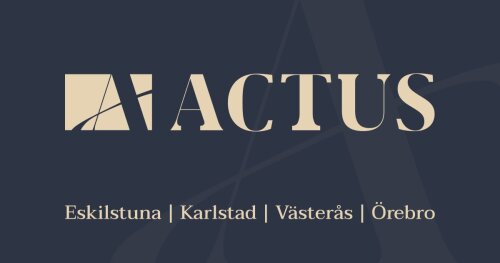Best Collaborative Law Lawyers in Örebro
Share your needs with us, get contacted by law firms.
Free. Takes 2 min.
Free Guide to Hiring a Family Lawyer
List of the best lawyers in Örebro, Sweden
About Collaborative Law in Örebro, Sweden
Collaborative Law is an alternative dispute resolution process that enables individuals to resolve legal conflicts, especially family law matters, outside the traditional court system. In Örebro, Sweden, collaborative law focuses on facilitating open communication and cooperation between parties with the help of specially trained lawyers. Rather than battling in a courtroom, parties agree to meet with their lawyers, and in some cases other professionals, to work towards mutually acceptable solutions. This method places the needs and interests of all involved parties, including children, at the forefront, and aims to minimize stress and conflict during legal proceedings, such as divorce or child custody disputes.
Why You May Need a Lawyer
Collaborative law can be highly beneficial in several common situations:
- Divorce or separation where both parties wish to maintain a respectful and amicable relationship
- Child custody and access arrangements, where the welfare of the child is a priority
- Discussions of parental support and financial arrangements post-separation
- Distribution of property and shared assets following the end of a partnership
- Family business or inheritance disputes that require a solution preserving familial bonds
Local Laws Overview
Collaborative law in Örebro operates within the Swedish legal framework. Some key points relevant to those considering collaborative law in Örebro include:
- Swedish Family Law encourages cooperation and prioritizes the best interests of children in all proceedings
- Collaborative law is a voluntary process - both parties must agree to participate and are free to withdraw at any time
- During collaborative proceedings, parties commit not to go to court; if negotiations fail and litigation is necessary, both lawyers must withdraw, safeguarding open and honest communication throughout the process
- Collaborative law professionals in Örebro are often members of organizations such as the Swedish Bar Association and may have additional training in mediation and negotiation
- Agreements reached during collaborative law sessions can be formalized into legally binding contracts, provided they adhere to Swedish legal standards
Frequently Asked Questions
What is Collaborative Law and how does it differ from traditional litigation?
Collaborative law is a method for resolving disputes, especially family matters, outside of court. Unlike litigation, it relies on open negotiations between both parties and their lawyers to find solutions together, saving time, costs, and reducing emotional strain.
Is collaborative law legally recognized in Sweden?
While "collaborative law" is not a distinct legal category, its processes are fully recognized and agreements reached can be made legally binding according to Swedish law.
Can we use collaborative law for divorce cases in Örebro?
Yes, collaborative law is commonly used for divorce cases, allowing couples to settle issues such as property division, financial arrangements, and child-related matters without court intervention.
What happens if one party wants to leave the collaborative process?
Participation is voluntary. If one party wants to leave or if the process is unsuccessful, both collaborative lawyers must withdraw, and parties can seek new legal representatives for court proceedings if necessary.
How are children’s interests protected in collaborative law?
The collaborative process places the child's best interests at the center. Parents and their lawyers work together to create arrangements that foster stability and well-being for the child.
How long does the collaborative law process typically take in Örebro?
Timelines vary depending on complexity and cooperation between parties. Collaborative law often resolves disputes more quickly than traditional litigation, sometimes in just a few meetings.
Are the discussions during collaborative law sessions confidential?
Yes, discussions remain confidential and cannot be used as evidence in court should the sessions end without an agreement.
Do I still need a lawyer if I use the collaborative process?
Yes, each party has their own lawyer who is specially trained in collaborative law, ensuring that both parties’ interests and legal rights are protected throughout the process.
Can we include other professionals in the collaborative process?
Yes, neutral professionals such as child specialists, financial experts, or mental health professionals can be included to address specific aspects of the dispute and facilitate better outcomes.
How are agreements made in collaborative law enforced?
Once an agreement is reached, it can be formalized into a legally binding contract or court order, provided it complies with Swedish legal standards.
Additional Resources
Those seeking further information or support for collaborative law in Örebro may find the following resources helpful:
- Swedish Bar Association - for finding collaborative law trained lawyers
- Swedish Courts (Domstol.se) - for general family law and dispute resolution guidance
- Örebro Municipality Family Law Office - local support services for families and children
- Organizations for mediation and family support in the Örebro region
Next Steps
If you are considering collaborative law for your legal issue in Örebro, begin by scheduling a consultation with a lawyer experienced in collaborative cases. Discuss your specific situation and determine if collaborative law is appropriate for your needs. Ensure all involved parties are willing to participate in good faith. The lawyer will explain the process, timelines, and estimated costs, and can help you initiate the first session. Remember to bring any relevant documents to the meeting and prepare to share your concerns and desired outcomes openly. Consulting early with a collaborative law specialist helps protect your interests and guides your next steps toward a constructive resolution.
Lawzana helps you find the best lawyers and law firms in Örebro through a curated and pre-screened list of qualified legal professionals. Our platform offers rankings and detailed profiles of attorneys and law firms, allowing you to compare based on practice areas, including Collaborative Law, experience, and client feedback.
Each profile includes a description of the firm's areas of practice, client reviews, team members and partners, year of establishment, spoken languages, office locations, contact information, social media presence, and any published articles or resources. Most firms on our platform speak English and are experienced in both local and international legal matters.
Get a quote from top-rated law firms in Örebro, Sweden — quickly, securely, and without unnecessary hassle.
Disclaimer:
The information provided on this page is for general informational purposes only and does not constitute legal advice. While we strive to ensure the accuracy and relevance of the content, legal information may change over time, and interpretations of the law can vary. You should always consult with a qualified legal professional for advice specific to your situation.
We disclaim all liability for actions taken or not taken based on the content of this page. If you believe any information is incorrect or outdated, please contact us, and we will review and update it where appropriate.










